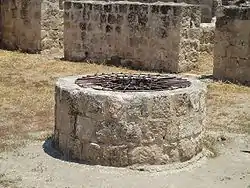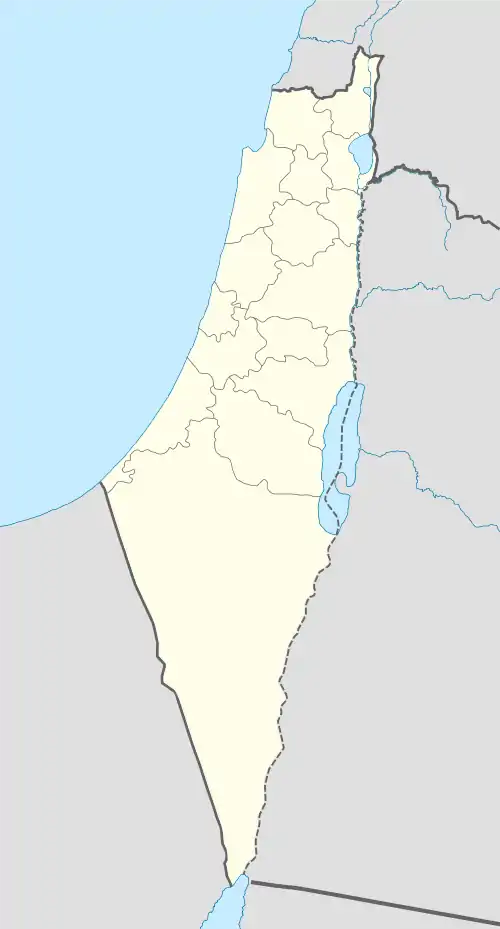Yarda, Safad
Yarda was a Palestinian hamlet in the Safad Subdistrict. It was depopulated during the 1947–1949 Palestine war. It was located 10.5 km northeast of Safad. The area is now part of Israel.
Yarda
ياردا | |
|---|---|
Village | |
 Well at Yarda | |
| Etymology: Kh. Wakkâs, the ruin of the man with a broken neck[1] Kh. Lôzîyeh, the ruin of the almond tree[2] | |
.jpg.webp) 1870s map 1870s map .jpg.webp) 1940s map 1940s map.jpg.webp) modern map modern map .jpg.webp) 1940s with modern overlay map 1940s with modern overlay mapA series of historical maps of the area around Yarda, Safad (click the buttons) | |
 Yarda Location within Mandatory Palestine | |
| Coordinates: 33°0′27″N 35°35′38″E | |
| Palestine grid | 205/268 |
| Geopolitical entity | Mandatory Palestine |
| Subdistrict | Safad |
| Population (1945) | |
| • Total | 20[3][4] |
| Current Localities | Ayyelet ha-Shahar[5] and Mishmar ha-Yarden[5] |
History
Khirbat Waqqas was located west-northwest of Yarda, and is recognised as the place the Canaanites referred to as Hazor. Victor Guérin found at Kh. Waqqas in 1875: 'Near a small enclosure, in the centre of which is a broken column consecrated to a santon, are shown the remains of an edifice oriented east and west, once probably a church. It was ornamented with monolithic columns in ordinary limestone, some broken pieces of which are still lying about. Other similar fragments are found in the neighbouring houses. Here and there I remarked cut stones, which no doubt belonged to this monument. A little to the south, a hillock is also covered with ruins of houses.'[6] In 1881, the PEF's Survey of Western Palestine (SWP) found at Kh. Wakkas only cattle-sheds.[7]
Yarda itself was located at a place called Kh el Loziyeh in the late Ottoman era. In 1881, the SWP found here: "Caves and ruined cattle sheds".[8]
British Mandate era
In the 1931 census of Palestine, conducted by the British Mandate authorities, Yarda had a population of 13 Muslims, in a total of 3 houses.[9]
In the 1945 statistics, the population was 20 Muslims,[3] who owned 1,367 dunams of land.[4] Of this, 1,359 dunams were used for cereals,[10] while 8 dunams were classified as un-cultivable area.[11]
Post 1948
After Yarda became depopulated, Ayyelet ha-Shahar took over some of the village land, while in 1949 Mishmar ha-Yarden was also settled on village land.[5]
In 1992 the village site was described: "The truncated walls of some houses still stand, as well as those of a khan, or caravansary. The site is strewn with stones from crumbled houses. A portion of the land is used as pasture."[12]
References
- Palmer, 1881, p. 86
- Palmer, 1881, p. 84
- Department of Statistics, 1945, pp. 09, 11
- Government of Palestine, Department of Statistics. Village Statistics, April, 1945. Quoted in Hadawi, 1970, p. 69
- Khalidi, 1992, p. 504
- Guérin, 1880, p. 452; as translated in Conder and Kitchener, 1881, SWP I, p. 248
- Conder and Kitchener, 1881, SWP I, p. 248
- Conder and Kitchener, 1881, SWP I, p. 242
- Mills, 1932, p. 111
- Government of Palestine, Department of Statistics. Village Statistics, April, 1945. Quoted in Hadawi, 1970, p. 118
- Government of Palestine, Department of Statistics. Village Statistics, April, 1945. Quoted in Hadawi, 1970, p. 168
- Khalidi, 1992, pp. 504-505
Bibliography
- Conder, C.R.; Kitchener, H.H. (1881). The Survey of Western Palestine: Memoirs of the Topography, Orography, Hydrography, and Archaeology. Vol. 1. London: Committee of the Palestine Exploration Fund.
- Department of Statistics (1945). Village Statistics, April, 1945. Government of Palestine.
- Grootkerk, Salomon E. (2000). Ancient sites in Galilee: a toponymic gazetteer (Illustrated ed.). BRILL. ISBN 978-90-04-11535-4. (p. 122)
- Guérin, V. (1880). Description Géographique Historique et Archéologique de la Palestine (in French). Vol. 3: Galilee, pt. 2. Paris: L'Imprimerie Nationale.
- Hadawi, S. (1970). Village Statistics of 1945: A Classification of Land and Area ownership in Palestine. Palestine Liberation Organization Research Center.
- Khalidi, W. (1992). All That Remains:The Palestinian Villages Occupied and Depopulated by Israel in 1948. Washington D.C.: Institute for Palestine Studies. ISBN 0-88728-224-5.
- Mills, E., ed. (1932). Census of Palestine 1931. Population of Villages, Towns and Administrative Areas. Jerusalem: Government of Palestine.
- Palmer, E.H. (1881). The Survey of Western Palestine: Arabic and English Name Lists Collected During the Survey by Lieutenants Conder and Kitchener, R. E. Transliterated and Explained by E.H. Palmer. Committee of the Palestine Exploration Fund.
External links
- Welcome to Yarda
- Yarda, Zochrot
- Yarda, Villages of Palestine
- Survey of Western Palestine, map 4: IAA, Wikimedia commons
- Yarda, at Khalil Sakakini Cultural Center